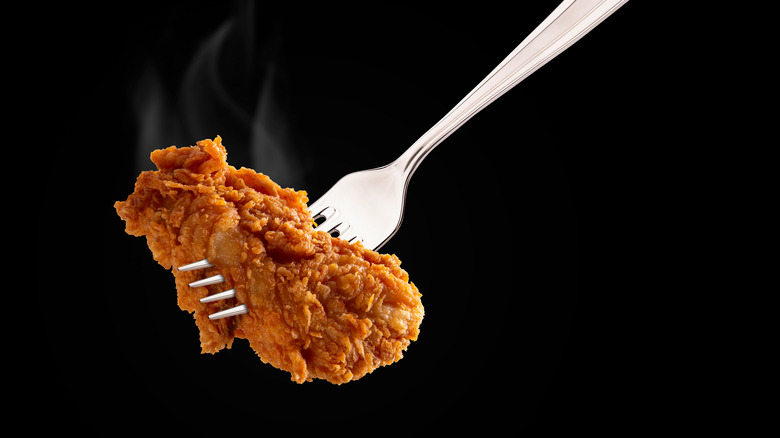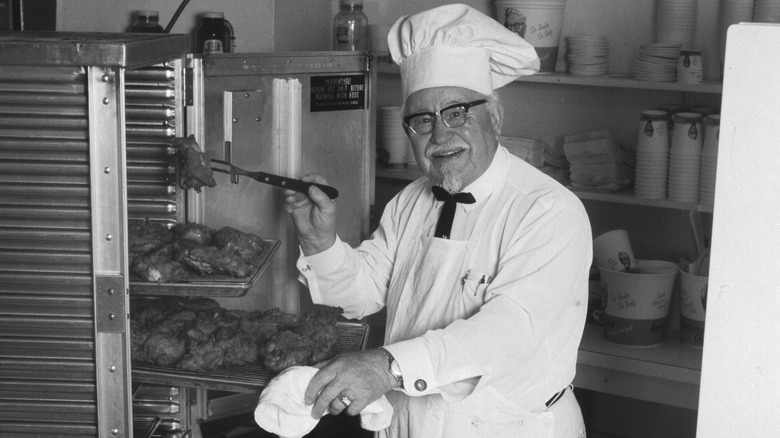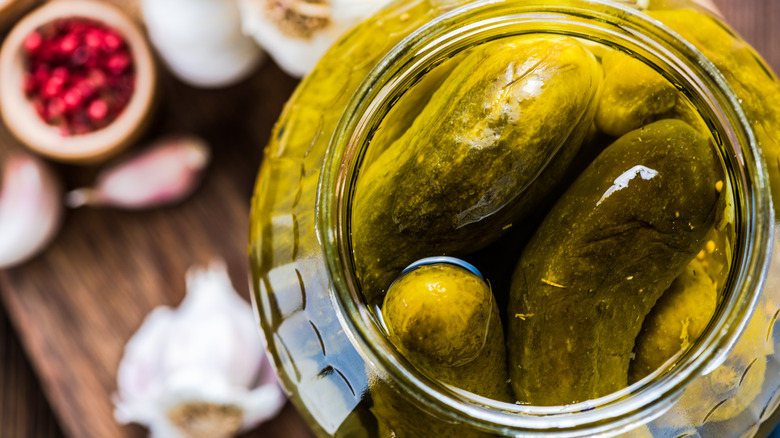The Strange Georgia Law That Makes Eating Fried Chicken With A Fork Illegal
Since 1776, the American government has drafted, reviewed, and signed laws into effect as guidelines for citizens to follow (via Judicial Learning Center). These are often enforced to keep the general public safe from harm. Still, while some are more serious and upholding, like not wearing your seatbelt or identity fraud, other laws can appear more aloof and downright silly.
Want to hunt Bigfoot? You may be out of luck in Skamania County, Washington. This area strictly prohibits the hunting and slaying of Bigfoot because it is viewed as an endangered animal, via USA Today. Can't make your wedding in Texas? Fortunately, you can legally ask someone to be your stand-in at your own wedding. But don't worry — you only need to announce you are married three times to be legally bound, even if the other party isn't there (per Arnold & Itkin).
But perhaps Georgia has the weirdest laws of all. While the "Goober State" may be known for its ripe peaches, classic baking soda-infused sweet tea, and never-ending homegrown peanuts, it is also home to some of the country's most ludicrous laws. In 1961, lawmakers in Gainesville, Georgia, pushed forward a mandate that outlawed the use of cutlery when dining on fried chicken, via Thrillist. Of course, nobody took this obsolete law seriously and continued to eat their hard-earned buckets with peace of mind and fork in hand. That is until people started to get arrested for it.
Even Colonel Sanders and the Poultry Princess had run-ins with law enforcement
Georgia Magazine notes that since 1961, law enforcement officials have visited many diners for violating the town's anti-cutlery law, including government administrators and one particularly familiar face. In 1977, the one-and-only Colonel Sanders was "arrested" for not sticking to his finger-lickin' motto. He was additionally "sentenced" to finishing his meal fork-free and required to come back to Gainesville for more fried chicken ventures.
Years later, in 2009, Ginny Dietrick gathered with friends and family at a local diner to celebrate her 91st birthday. The Gainesville Times reports that she was dining on her plate of crispy fried chicken, fork in hand, when she was approached by the city's Police Chief, stating she was under arrest for breaking the sacred Georgia law. Little did Dietrick know she was being pranked by a friend, who happened to get Dietrick's comical crime almost immediately "dismissed" by the town's Mayor. Dietrick was soon deemed that year's Honorary Georgia Poultry Princess and, like Colonel Sanders, was encouraged to return to the city to eat more fried chicken.
Fortunately, this law does not have any serious repercussions. Gainesville is commonly referred to as the 'Poultry Capital of the World' for its vast amount of poultry farms. For this reason, community members drafted the 1961 law to popularize the town's moniker, via 10News. The city is currently represented by its towering chicken monument and holds annual poultry-related celebrations.
Breaking these state laws can really put you in a pickle
From being unable to sell old fryer grease in North Carolina to outlawing margarine in Wisconsin, various states have created strange food-related ordinances. While some may be traced back to a practical joke, like eating peanuts while walking backward in New York, others have more serious backgrounds and repercussions.
Connecticut is one of the more austere states regarding farm-to-table products. For home-grown pickles to be legally sold and distributed, they must pass a strict test to ensure their quality is of the highest standard: They must bounce. Connecticut Insider reports that this law came about in 1948 after a set of unregulated pickles splattered on the ground. According to a newspaper clipping from the Hartford Courant, the two suppliers were arrested with a $2,000 bond each, or $25,000 today (per CPI Inflation Calculator). While these pickle regulations may not be totally unfounded, there are better ways to tell if your pickle is still good.
However, food is not the only thing these absurd laws pertain to. Take pinball, for example. From the 1940s to the 1970s, many states claimed these machines negatively influenced the youth and increased crime rates, per History. Today, Arkansas still has a statute against pinball machines. According to AR Code § 5-66-111 (2012), a pinball machine cannot legally allow winners to play more than 25 free games (via Justia US Law). Doing so would incur a $1,000 fine or jail time of up to one year.


